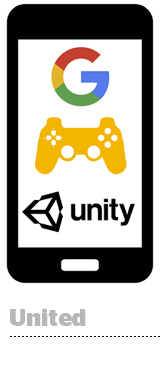
Google is going full-court press on universal app campaigns (UAC) through a partnership with Unity Technologies, a company that makes development tools for game creators.
Starting Thursday, Unity’s more than 10 million developers have access to advertiser demand from AdMob via a direct integration. It’s the first partnership of this nature between Google and a gaming engine.
By the same token, Google advertisers can more easily run UAC campaigns through the Unity ad platform, which reaches around 1.5 billion Android and iOS devices globally. More than 50% of all new mobile games are created using Unity’s tech.
The purpose of UAC, which became the default way to run paid app-install campaigns across Google in 2015, is to help advertisers find the most relevant audiences across Google’s properties without having to choose the placements or do the optimizations themselves.
A machine learning algorithm automatically adjusts the bids and puts ads wherever people are most likely to engage, whether that’s search, the Play store, YouTube, the Google Display Network or now Unity apps.
Google says it’s driven more than 11 billion installs through paid universal app campaigns as of Q2.
Even so, some advertisers are still a little reticent to advertise in games. But there’s no reason to be, said Sissie Hsiao, Google’s VP of mobile advertising.
It’s easy to generalize and say “Advertisers are skittish about games” or “Games are a great opportunity for everyone,” but that obfuscates the point, which is that large audiences are playing lots of different games and if advertisers want to reach them, they need to sit down and figure out which types of games fit into their media plan.
“Advertisers should seek performance and value wherever inventory reaches their bar, and mobile games are no different,” Hsiao said. “If an advertiser can find the demo they want in a brand-safe environment, that audience is willing to watch an entire video ad and you can see brand lift, I don’t see a problem with that.”
But it’s getting easier to get advertisers to hop on board, especially with more access to interesting supply, said Julie Shumaker, VP of advertiser solutions at Unity.
Rewarded, for example, makes up the majority of ads served within Unity games and is one of the best-performing formats available through AdMob.
“It’s a very engaged player experience and developers work it right into their game play,” said Shumaker, who noted that there’s recently been “new momentum” behind brands moving toward mobile games.
“They’re seeing that games are brand-safe, the content is professionally produced, it’s an opt-in experience and the engagement is there,” she said.
Some 71% of mobile gamers don’t multitask when they’re playing a game, according to Unity data, which means their attention is on the screen. Game ads are also increasingly interactive, which means users are likely to pay attention. You can’t say the same for television.
Two-thirds of consumers recently surveyed by OpenX and the Mobile Marketing Association said they’re open to viewing a 15-second ad in return for discounts, free content or in-app gaming rewards. Sixty-five percent of marketers plan to spend more on opt-in video in 2019.
“When users opt in to an experience in exchange for value, that’s when we see them really engage,” Hsiao said.
This post was syndicated from Ad Exchanger.


More Stories
AppLovin is Officially the New Target of Short Sellers
Is Tegna Looking to Hub Weather in Its Local Markets?
Stuff Group taps Belinda Francis to lead North Island Markets